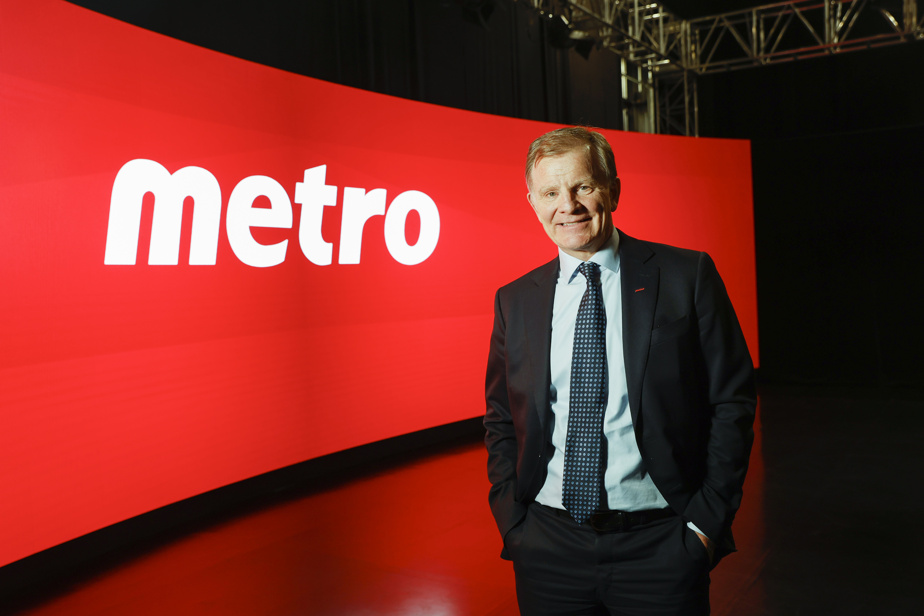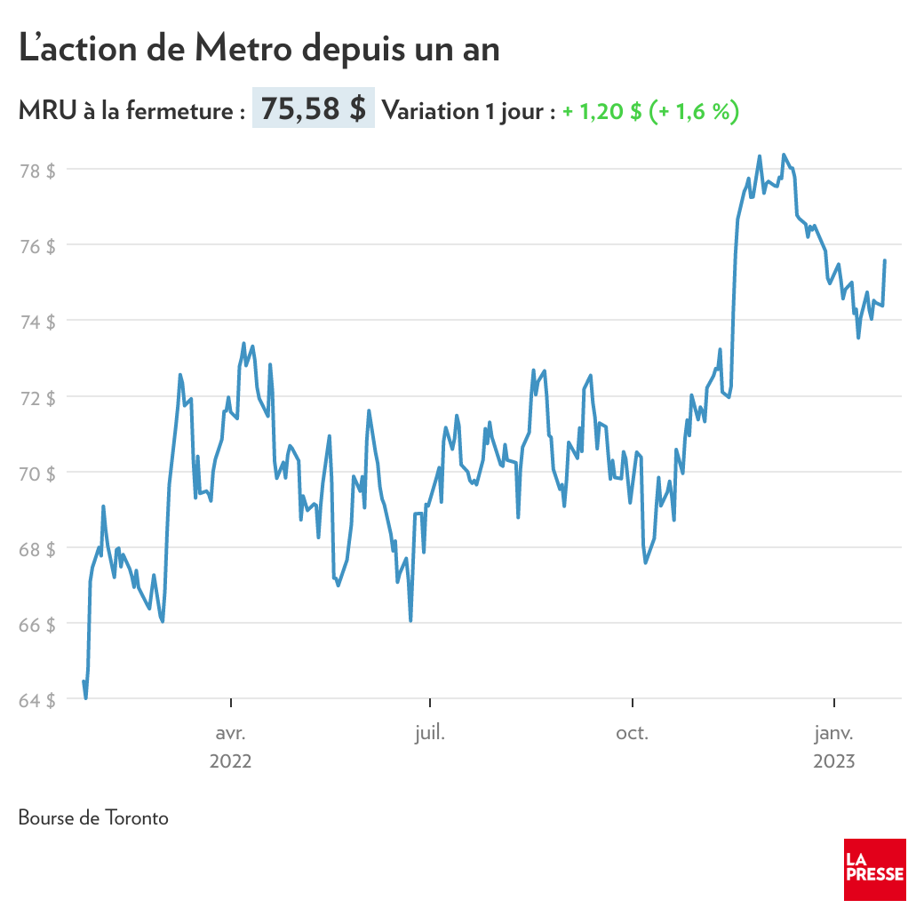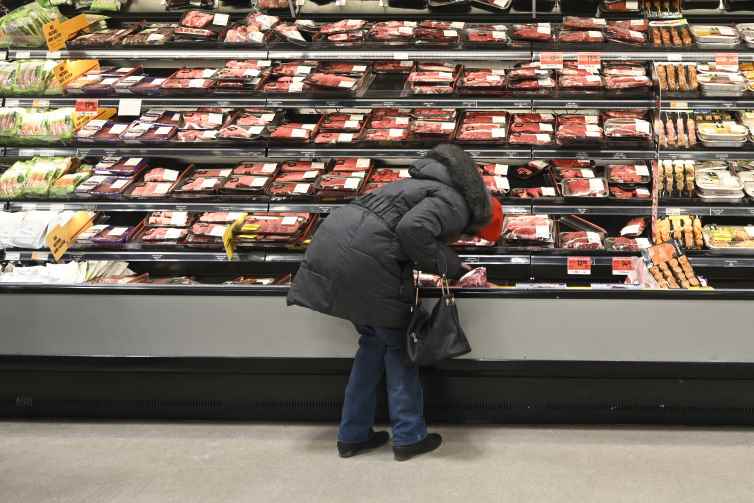(Montreal) The grocery bill will continue to rise over the next few months. After receiving 27,000 requests for price increases in 2022 from suppliers who supply stores with cheese, cookies and other frozen products, Metro warns that there will also be several thousand more in 2023. Result: retail prices will also inflate.
“Unfortunately, the inflation continues. In the coming weeks, the next few months, there will be price increases, “warned the president and chief executive of Metro, Éric La Flèche, during a press briefing held on the sidelines of the meeting. shareholders’ annual meeting, Tuesday.
“From 1er February, there will be some price increases based on the cost increases that we will accept, he added. Discussions are continuing. We negotiate hard. But [il y a] suppliers who insist and who will obtain price increases if we want to continue to have access to the goods. »

PHOTO MARTIN CHAMBERLAND, THE PRESS
Éric La Flèche, President and CEO of Metro
Once a year, the big brands send a letter to their suppliers informing them of the period during which no change in the wholesale price will be accepted. Generally, this period of frost (blackout) begins in early November and ends in late January. According to the suppliers consulted, this way of doing things is imposed by the brands. They have no choice but to comply. The amount displayed on the product once placed on the shelves may vary throughout the year, even during the period when the wholesale price remains fixed.
From the beginning of February, when supplier requests are again assessed, consumers wandering the grocery store aisles may see that prices have changed, warns Mr. La Flèche. “We will do our best to make it gradual and progressive. »
According to him, last year with 27,000 requests for increases of 10% or more, the volume was “abnormally high”. ” [Les fournisseurs] asked us for raises more often and for more money than usual. These increases affected several grocery products, excluding fruits and vegetables, fish, meat and bakery products.
Can we expect there to be so many in the coming year? “I hope not,” replied Mr. La Flèche spontaneously, during an interview granted to The Press later at the end of the day. “There are a few thousand requests that are being processed. There are many. How close are we going to be at the end of September? How will global inflation evolve? I don’t have that crystal ball unfortunately. »
The main brands in the country are also the subject of an investigation by the Competition Bureau, which will scrutinize price increases. The conclusions should be made in June.
Relations with suppliers
Although, in this context, relations are sometimes strained between suppliers and the various brands, the big boss of Metro for his part repeated on a few occasions that relations were “good”. However, on condition of anonymity, several of them have already told The Press that their relationship with the grocer was particularly difficult. In this regard, a code of conduct to try to improve relations between retailers and suppliers was recently unveiled.
“What we read is that [ce sont] the big bad retailers who abuse suppliers, we are not there at all, replies Mr. La Flèche. Everyone is entitled to their opinion. In general, we have good relations with our suppliers. We have a climate of cordial collaboration. »
“There are sometimes tensions,” he admits. There may be situations where it’s less funny. But that’s not a problem. Currently, it is the suppliers who [font des demandes] with increases like we’ve never seen,” he said.
Metro executive bonuses
Following the announcement of bonuses totaling $3.7 million obtained by Metro executives, while the inflationary context is driving up the price of food, Éric La Flèche recognizes that this decision could “raise questions”. However, he believes that these bonuses are not “exaggerated”. “It’s definitely a lot of money. In an inflationary context, this can raise comments. “But we must distinguish this reality, which is global, between the performance of the company and the achievement of objectives by the company and its managers,” he adds. The bonuses at Metro are pretty constant over the years. They are not exaggerated. We are a public company of significant size, it has to be competitive. »
Super C is gaining popularity

PHOTO HUGO-SÉBASTIEN AUBERT, LA PRESSE ARCHIVES
Super C, Metro’s low-cost brand, is full of new customers. With the opening of four stores between the fall of 2022 and the summer of 2023, the company ensures that its two brands can coexist in close proximity, without harming the sales of either.
“We continue to see the transfer of sales between conventional banners and discount banners,” said Eric La Flèche, President and CEO of Metro, during a press briefing on the sidelines of the annual meeting. shareholders on Tuesday. We are well positioned with Super C and Food Basics [en Ontario]. »
“Discount stores on average [enregistrent] higher weekly sales than conventional stores, he added. There are more discount stores than a year ago, two years ago, or five years ago. »
Faced with this popularity, Metro will open new stores with the red and yellow sign, which will bring the number of Super Cs in Quebec to 103. It should be noted that a low-cost brand – managed by the company – sometimes sets up near a Metro merchant, sometimes causing friction. “It can lead to some discussions, admitted Mr. La Flèche, in an interview. We don’t do this in secret. When we go to a market where there is a Metro, it is done with respect and we work with our merchants. We put programs in place so that they are protected as much as possible, but as [entreprise], we do better when there are both. »

PHOTO MARTIN CHAMBERLAND, THE PRESS
Éric La Flèche, President and CEO of Metro
“There are Metro stores that are doing very well in several markets, but they don’t have 100% market share,” he adds. There is a portion of customers who seek stores with slightly lower prices, less service. Customers move between the two, but there is a customer who is basically more conventional and there is a customer who is more discount-oriented. »
According to him, opening a Super C near a Metro grocery store will not cannibalize sales in the long term. “If we think there’s room for one discount store, if it’s not us, maybe it’s going to be another. So maybe it’s best to keep it in the family. »
Results above expectations
In addition, the increase in prices still allowed Metro to unveil revenues and profits above expectations in the first quarter, according to the results published on Tuesday.
The owner of the Metro, Super C and Jean Coutu brands announced a net profit of 231.1 million, which represents an increase of 11.3% compared to the same period last year. Diluted adjusted earnings per share, for its part, amounted to $1. Prior to the earnings release, analysts had expected earnings per share of 98 cents, according to Refinitiv. Metro sales rose 8.2% to 4.671 billion compared to the same period last year. Same-store sales in the food sector, which excludes store openings and closings, rose 7.5%.

In the pharmaceutical sector, comparable sales increased by 7.7%, thanks to a stronger than average flu season, when influenza, colds, COVID-19 and syncytial virus were widely circulating.
Overall, Metro slightly beat analysts’ expectations thanks to strong sales and good cost control while margins were under pressure, said CIBC World Markets analyst Mark Petrie. “These are very good results considering inflation and the fact that Metro already has a light operating structure,” he comments. Chris Li of Desjardins Capital Markets believes the company will be able to increase earnings per share by 8% this year, “despite moderating inflation.” “Its premium valuation at 17.5 times the price-earnings ratio, compared to an average of 16 times, however, encourages us to stay on the sidelines. Metro’s board of directors has adopted a 10% increase in the company’s quarterly dividend.
Metro shares ended Tuesday’s session with a gain of $1.20, or 1.6%, to $75.58 on the Toronto Stock Exchange.
With The Canadian Press
